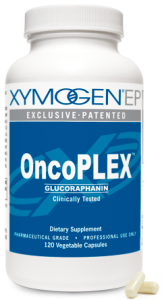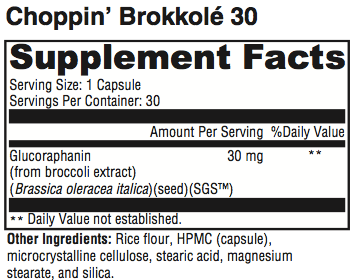OncoPLEX
 Glucoraphanin (also known as sulforaphane glucosinolate or “sgs”) is a naturally occurring phytochemical found in cruciferous vegetables and in OncoPLEX formulas. Glucoraphanin, which is heat stable and water soluble, is metabolized in the body to the biologically active isothiocyanate sulforaphane (SFN).Scientists at Johns Hopkins University School of Medicine isolated sulforaphane in 1992 and identified glucoraphanin as its precursor. Since their discovery, over 500 scientific studies have been conducted on SFN and glucoraphanin, documenting their positive effects on antioxidant activity, detoxification, cellular metabolism, and cell-life regulation.[1-3] Glucoraphanin and SFN appear to be the “missing link” that correlates a diet rich in cruciferous vegetables (from the Brassicaceae family) with good health. Glucoraphanin from food is enzymatically converted to SFN via the action of the myrosinase enzyme during chewing and food preparation (cutting/ slicing). Gastrointestinal microorganisms are able to produce SFN from glucoraphanin as well. Microorganism conversion is an important contribution to SFN production as the myrosinase enzyme is easily inactivated by heat.*[4]Early research identified broccoli sprouts as a concentrated source of glucoraphanin.[5] It is present in much higher concentrations in broccoli seeds and three-day–old broccoli sprouts than in the mature vegetable.[6,7] One capsule of OncoPLEX provides 30 g of glucoraphanin, which equates to approximately 0.33 oz of broccoli sprouts or 8 oz of broccoli. One capsule of OncoPLEX ES equates to 1.3 oz of broccoli sprouts or 27 oz of broccoli.[5]Antioxidant and Detoxification Support Sulforaphane, upon conversion from glucoraphanin, is found to be an effective long-acting indirect antioxidant and significant inducer of phase II detoxification enzymes.[3,4] Research suggests that SFN strongly induces expression of key enzymes (via the KEAP1/Nrf2/ARE pathway), which in turn supports antioxidant activity, redox cycling, and phase II detoxification. The antioxidant enzymes generated are believed to participate in the recycling and maintenance of vitamins A, C, and E as well.[4] After studying the effects of various doses of glucoraphanin administered to study subjects, researchers suggest that there may be a dose-dependent association between glucoraphanin and antioxidant enzyme induction. Accordingly, a metabolically effective dose may vary from tissue to tissue (e.g., upper airway, gastric mucosa, mammary, etc.).[4,8]
Glucoraphanin (also known as sulforaphane glucosinolate or “sgs”) is a naturally occurring phytochemical found in cruciferous vegetables and in OncoPLEX formulas. Glucoraphanin, which is heat stable and water soluble, is metabolized in the body to the biologically active isothiocyanate sulforaphane (SFN).Scientists at Johns Hopkins University School of Medicine isolated sulforaphane in 1992 and identified glucoraphanin as its precursor. Since their discovery, over 500 scientific studies have been conducted on SFN and glucoraphanin, documenting their positive effects on antioxidant activity, detoxification, cellular metabolism, and cell-life regulation.[1-3] Glucoraphanin and SFN appear to be the “missing link” that correlates a diet rich in cruciferous vegetables (from the Brassicaceae family) with good health. Glucoraphanin from food is enzymatically converted to SFN via the action of the myrosinase enzyme during chewing and food preparation (cutting/ slicing). Gastrointestinal microorganisms are able to produce SFN from glucoraphanin as well. Microorganism conversion is an important contribution to SFN production as the myrosinase enzyme is easily inactivated by heat.*[4]Early research identified broccoli sprouts as a concentrated source of glucoraphanin.[5] It is present in much higher concentrations in broccoli seeds and three-day–old broccoli sprouts than in the mature vegetable.[6,7] One capsule of OncoPLEX provides 30 g of glucoraphanin, which equates to approximately 0.33 oz of broccoli sprouts or 8 oz of broccoli. One capsule of OncoPLEX ES equates to 1.3 oz of broccoli sprouts or 27 oz of broccoli.[5]Antioxidant and Detoxification Support Sulforaphane, upon conversion from glucoraphanin, is found to be an effective long-acting indirect antioxidant and significant inducer of phase II detoxification enzymes.[3,4] Research suggests that SFN strongly induces expression of key enzymes (via the KEAP1/Nrf2/ARE pathway), which in turn supports antioxidant activity, redox cycling, and phase II detoxification. The antioxidant enzymes generated are believed to participate in the recycling and maintenance of vitamins A, C, and E as well.[4] After studying the effects of various doses of glucoraphanin administered to study subjects, researchers suggest that there may be a dose-dependent association between glucoraphanin and antioxidant enzyme induction. Accordingly, a metabolically effective dose may vary from tissue to tissue (e.g., upper airway, gastric mucosa, mammary, etc.).[4,8]
Activation of transcription factor Nrf2 induces increased output of specialized enzymes, an output that can extend antioxidant activity 72 hours or more. This is a significantly longer activity phase than direct antioxidants, such as vitamin C, vitamin E, and beta-carotene, are able to promote.[2,6,9-11] Adequate antioxidant protection is crucial to maintaining the health and function of cells, tissues, and organs. Because they assist in maintaining health throughout adult life, phytonutrients, such as glucoraphanin and SFN, are considered “lifespan essentials.”[12]
Support for Cellular Health and Cell-Life Cycles Glucoraphanin and SFN are believed to play an important role in maintaining healthy gastrointestinal flora; healthy cellular life cycles; immune, eye, and cardiovascular health; and a normal response to inflammation. Sulforaphane’s induction of phase II enzymes, coupled with an inhibitory effect on certain phase I enzymes, is considered to have a protective effect on cells. Research suggests that SFN plays a multidimensional role in maintaining normal cellular life cycles, inhibiting tubulin polymerization, activating checkpoint 2 kinase, and inhibiting histone deacetylase activity.[2,13,14] These actions assist in gene regulation, normal cell growth, and cytokine balance.*
Research suggests that sulforaphane’s effect on Nrf2 pathways, macrophage activation, and NF-kappa B may support a normal, healthy response to inflammation and promote cardiovascular and eye health.[2,15-18] Sulforaphane is also studied for its role in maintaining immune health and a healthy gastrointestinal microflora.*[19,20]
Directions
Take 1 capsule daily
References
- Zhang Y, Talalay P, Cho CG, et al. A major inducer of anticarcinogenic protective enzymes from broccoli: isolation and elucidation of structure. Proc. Natl. Acad. Sci USA. 1992 Mar 15;89(6):2399-403. [PMID: 1549603]
- Cheung KL, Kong AN. Molecular targets of dietary phenethyl isothiocyanate and sulforaphane for cancer chemoprevention. AAPS J. 2010 Mar;12(1):87-97. [PMID: 20013083]
- Sulforophane glucosinolate. Monograph. Altern Med Rev. 2010 Dec;15(4):352-60. Review. [PMID: 21194251]
- Boddupalli S, Mein JR, Lakkanna S, et al. Induction of phase 2 antioxidant enzymes by broccoli sulforaphane: perspectives in maintaining the antioxidant activity of vitamins a, C, and e. Front Genet. 2012;3:7. Epub 2012 Jan 24. [PMID: 22303412]
- Brassica®. http://www.brassica.com. Accessed May 5, 2012.
- Fahey JW, Zhang Y, Talalay P. Broccoli sprouts: an exceptionally rich source of inducers of enzymes that protect against chemical carcinogens. Proc Natl Acad Sci USA. 1997 Sep 16;94(19):10367-72. [PMID: 9294217]
- West LG, Meyer KA, Balch BA, et al. Glucoraphanin and 4-hydroxyglucobrassicin contents in seeds of 59 cultivars of broccoli, raab, kohlrabi, radish, cauliflower, Brussels sprouts, kale, and cabbage. J Agric Food Chem. 2004 Feb 25;52(4):916-26. [PMID: 14969551]
- Riedl MA, Saxon A, Diaz-Sanchez D. Oral sulforaphane increases Phase II antioxidant enzymes in the human upper airway. Clin Immunol. 2009 Mar;130(3):244-51. [PMID: 19028145]
- Shapiro TA, Fahey JW, Wade KL, et al. Chemoprotective glucosinolates and isothiocyanates of broccoli sprouts: metabolism and excretion in humans. Cancer Epidemiol Biomarkers Prev. 2001 May;10(5):501-8. [PMID: 11352861]
- Nestle M. Broccoli sprouts as inducers of carcinogen-detoxifying enzyme systems: clinical, dietary, and policy implications. Proc Natl Acad Sci USA. 1997 Oct 14;94(21):11149-51. [PMID: 9326574]
- Wagner AE, Ernst I, Iori R, et al. Sulforaphane but not ascorbigen, indole-3-carbinole and ascorbic acid activates the transcription factor Nrf2 and induces phase-2 and antioxidant enzymes in human keratinocytes in culture. Exp Dermatol. 2010 Feb;19(2):137-44. [PMID: 19558496]
- Holst B, Williamson G. Nutrients and phytochemicals: from bioavailability to bioefficacy beyond antioxidants. Curr Opin Biotechnol. 2008 Apr;19(2):73-82. [PMID: 18406129]
- Myzak MC, Dashwood RH. Chemoprotection by sulforaphane: keep one eye beyond Keap1. Cancer Lett. 2006 Feb 28;233(2):208-18. Review. [PMID: 16520150]
- Ho E, Clarke JD, Dashwood RH. Dietary sulforaphane, a histone deacetylase inhibitor for cancer prevention. J Nutr. 2009 Dec;139(12):2393-6. [PMID: 19812222]
- Zakkar M, et al. Activation of Nrf2 in endothelial cells protects arteries from exhibiting a proinflammatory state. Arterioscler Thromb Vasc Biol. 2009 Nov;29(11):1851-7. [PMID: 19729611]
- Wu L, Noyan-Ashraf MH, Facci M, et al. Dietary approach to attenuate oxidative stress, hypertension, and inflammation in the cardiovascular system. Proc Natl Acad Sci U S A. 2004 May 4;101(18):7094-9. [PMID: 15103025]
- Noyan-Ashraf MH, Sadeghinejad Z, Juurlink BH. Dietary approach to decrease aging-related CNS inflammation. Nutr Neurosci. 2005 Apr;8(2):101-10. [PMID: 16053242]
- Gao X, Talalay P. Induction of phase 2 genes by sulforaphane protects retinal pigment epithelial cells against photooxidative damage. Proc Natl Acad Sci USA. 2004 Jul 13;101(28):10446- 51. [PMID: 15229324]
- Yanaka A, Fahey JW, Fukumoto A, et al. Dietary sulforaphane-rich broccoli sprouts reduce colonization and attenuate gastritis in Helicobacter pylori-infected mice and humans. Cancer Prev Res (Phila). 2009 Apr;2(4):353-60. [PMID: 19349290]
- Kim HJ, Barajas B, Wang M, et al. Nrf2 activation by sulforaphane restores the age-related decrease of T(H)1 immunity: role of dendritic cells. J Allergy Clin Immunol. 2008 May;121(5):1255-1261. [PMID: 18325578]









